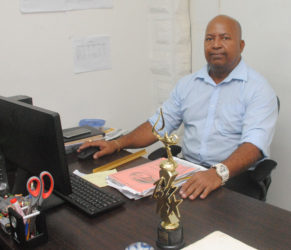At a time when private schools are attracting more than customary media attention on account of the current controversy raging over the official decision that private education must now attract Value Added Tax, Henry Chase, the owner and Principal of Chase Academy believes that it is important that the brouhaha does not take away from the role that the private school has to play in the overall education system.
He concedes that private schools, like other legitimate businesses must live within the law and that, he says, means that they must pay their taxes. What concerns him is that engagement with government on the issue of taxes not become the subject of bad blood or confrontation.
It is on the challenges which he says are often linked to the business of private education that he wishes to comment. Chase Academy is currently in its seventeenth year, having been established in 2006.

Chase says plans for the establishment of the school had existed since the late 1990s. After he had taught at a succession of state schools the University of Guyana graduate had gone to the Turks and Caicos Islands to take up a teaching contract, which he says “simply never worked out.” It took him three weeks to decide to return home and his subsequent stint within the ranks of the employed provided him with the breathing space to dust off and pursue his plan.
The gap between serving as a teacher in a state school and embarking of the business of education delivery is considerable and Chase concedes that the adventure was not without its challenges. He managed, however, to build what is now a successful institution without resort to a commercial bank or to any other institution, for that matter.
These days Chase Academy offers the full range of secondary education as well as a regimen of additional tuition for children who need it. Contextually, he dismisses what he says is the dangerous fallacy the privately-run educational institutions exist purely for the convenience of the rich. Such a notion, he says, entirely underestimates the fact that working class parents too have exalted intellectual ambitions for their children and therefore make the sacrifices necessary to expose them to the best possible education.

However, there is a price to be paid for the delivery of private education with a social conscience, Chase says. It involves accepting the reality of what, often, are serious lapses in the timely payment of school fees and awarding scholarships to some children whose parents would not otherwise be able to afford to pay. Then there are those children who combine academic prowess with capabilities on the field of play to realize their own self-fulfillment whilst bringing a generous measure of honour to the school. Chase says that wherever talent may repose it should be nurtured and turned into opportunity.
Chase is not unmindful of the business imperative that underlies the institution that he runs. He believes, he says, that the challenges confronting the education system in Guyana necessitate that teaching and learning take place against the backdrop of a social conscience. Much of this is driven by the fact that he has met parents at every level including, he says, “parents who throw box hands to pay their children’s fees.”
Benevolence, however, cannot pay the bills and Chase says that what he has learnt is that “in business there is a line that has to be drawn.” That is where, for this dyed-in-the-wool educator, the rubber hits the road. The phenomenon of conscience and the imperative of having to meet the bills are ill-suited bedfellows so that his work is not without its awkward moments.
Beyond both the state-run schools and the private institutions, Chase believes that financing education is a broader responsibility. Apart from what he says is the importance of being mindful that private education does not descend into a routine rip off, there is also the responsibility of the broader entrepreneurial community to “give back,” to apply the principle of corporate social responsibility to helping to ensure that the standard of education is adequately responsive to the country’s developmental needs.




